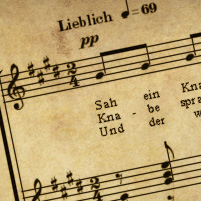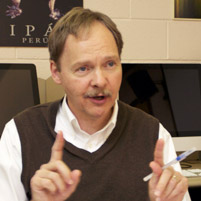Language of Music


Professor Christian W. Hallstein
On April 12, German music and language will come together in a Liederabend, or evening of song.
It's made possible by a unique collaboration between Carnegie Mellon University's School of Music and the Department of Modern Languages.
Organized by Mark Carver, associate teaching professor, vocal students will be singing German art songs, or 'Lieder,' from the early 19th century.
These popular pieces were composed by figures such as Brahms, Beethoven and Schubert, who set German poetry to music.
Written translations will be provided by the language students of Christian Hallstein, teaching professor of German. The English text will be in prose, to give listeners the most accurate understanding.
"Most of the existing translations are in poetic form so they can be sung," explained Hallstein. "The problem is that they're often quite bad because you have to change the words and rhythm. It puts the translator in a strait jacket."
"Professor Hallstein is giving us room to dig a little deeper, find a truer, more artful translation," noted Asha Carroll (A'11).
Carroll is a voice major who is both singing in the Liederabend and participating in the translation workshop.
For six years, students like Carroll have worked with songs in French, Italian and Spanish. This is the second German Liederabend.
"Students are expanding their knowledge of the language, the theory and practice of translation, and of German literature and music of the romantic period. It's an era they might not get to study otherwise," said Hallstein.
"The romantic period is an integral part of German culture," added Carroll. "In a history course we might speak about it, but this is an opportunity to delve deeper and get an insight into what life was like."
Hallstein enjoys incorporating many art forms in his teaching. He typically includes film and visual art. He's also worked twice with the School of Drama.
"Professor Hallstein is definitely open to collaboration," said Carroll. "This translation workshop isn't typical. More than the usual speaking, reading and writing, this class is crossing into new territory."
Carroll has made it a point to take a language course each semester, well beyond the requirement for voice majors.
"I think that having a better understanding of these languages allows me to connect more deeply to the characters that I'm singing," she said. "It's furthered my artistry and my understanding."
She's appreciated her varied educational experiences, as well as her performance opportunities.
"Carnegie Mellon provides opportunities for undergraduates that are normally afforded just to graduate students in other programs," she said. "That prepares and encourages us to be independent thinkers."
Related Links: School of Music | Dept of Modern Languages
